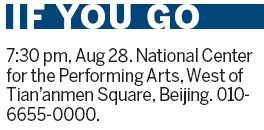
"Throughout my 30 years on stage at opera houses across Europe, I've felt that almost all of my colleagues and audiences knew nothing about Chinese music and history," says the 58-year-old.
"I bet millions of Chinese are learning English and watching Hollywood movies, but how many Chinese movies have audiences in the West seen? How much do they know about China besides Chinese food and kung fu?"
Thanks to the success of its debut year, I Sing Beijing's auditions held in 2011 across the US and Europe attracted thousands of young vocalists.
Sophia Chew, a mezzo-soprano from Piedmont, California, came to Beijing in early August and it was the first time she has actually seen the city, apart from on television.
Chew, like the other singers in the program, had to learn Mandarin for her roles, with help from professors at the China Conservatory of Music.
Her songs for the concert at the NCPA will be Jasmine Flower, which can be considered China's most popular folk melody, and My Homeland.
"I sang when I visited the Great Wall this morning and people around me cheered and clapped happily," she says. "They just sang along with me and then I knew how familiar they were with the songs and what the music meant to them."
"Two of the girls went to a manicure studio yesterday and they sang Chinese songs to the staff there, who all got very excited and sang along," says Zhu Ailan, a veteran soprano from the Beijing Conservatory of Music, who has been tutoring the group.
"Lots of Chinese phonetics don't exist in English but the Western students imitate the pronunciations, and they can sing in Chinese fluently in just a few days. They get to know the stories behind the songs and accurately capture the feelings.
"For the Chinese audience, it will also be a novel experience listening to the foreign singers singing Chinese songs they grew up with," Zhu adds.
In the first year of the I Sing Beijing program, Peter McClintock, a stage director with the Metropolitan Opera for more than 22 years, showed his support by becoming the director and acting coach.
McClintock has produced about 50 operas with the Met Opera, and is a long-time friend of Tian.

"More and more audiences in the West are enjoying Chinese operas, both traditional and modern," McClintock says. "The development of opera is like a microcosm of the country, fast and ambitious."
Tian agrees that the future of opera may be in China, although it is fading from popular consumption in the West. To that end, his dream is to train young Western professionals to sing Chinese contemporary opera so it can join the mainstream repertoire.
"In the past few years, more than 50 new opera houses have been built across China and more opera singers from the West are performing in China. The rich history in China also provides lots of inspiration for opera.
"The potential for Chinese opera is huge, both at home and abroad. My ultimate dream is to build a theater, which has an all-foreign cast singing in Mandarin, maybe next year," Tian says. But first, he will take this Western cohort to the Lincoln Center Theater in New York in February.
The I Sing Beijing singers were recipients of full scholarships sponsored by the Confucius Institute, a government agency that actively promotes Chinese language and culture outside China.
Contact the writer at chennan@chinadaily.com.cn.